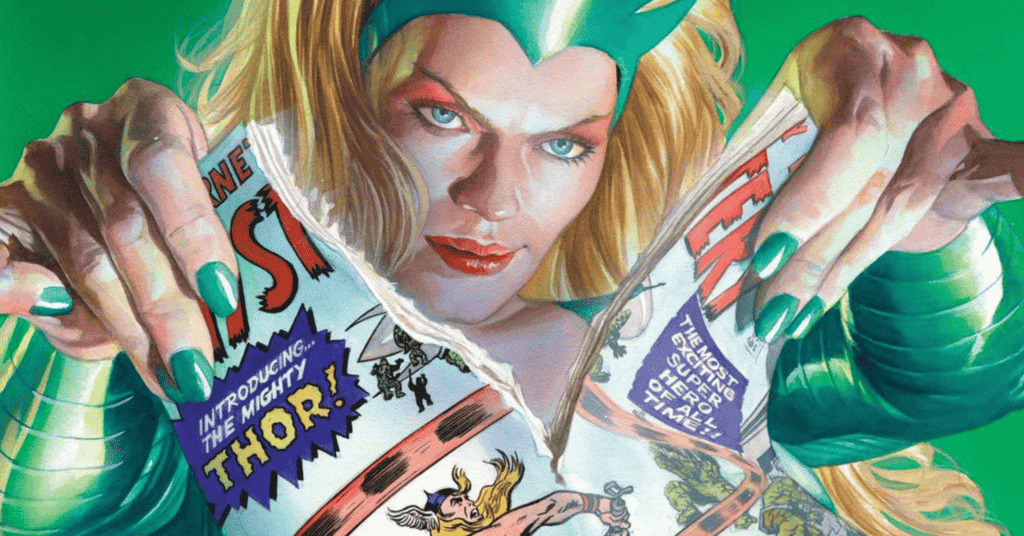Immortal Thor #9
Recap
After traveling to his mother Gaea's domain and learning his purpose (to be Midgard's savior), Thor is on the go once more, to put a stop to the ecological devastation brought on by Roxxon's literally monstrous CEO, the Minotaur—and save Earth from his mother's vengeance in the process.
Review
In this month’s Immortal Thor, Thor finally goes up against the cartoonishly evil capitalist Dario Agger, a.k.a. the Minotaur, CEO of Roxxon Industries. And he isn’t out to defeat Thor alone: Thor’s antagonists Enchantress and Executioner are along for the ride. No longer purely a parody of energy corporations, Roxxon is now a parody of media conglomerates, too. For the Minotaur, Executioner, and Enchantress, the goal is no longer just to destroy Thor the god, but to control Thor the idea—and Thor the comic.
from the pages of Immortal Thor #4
Alex Ross’ cover depicting Enchantress ripping up Thor’s first Marvel comic, Journey Into Mystery #83 (and seemingly Immortal Thor’s title, too), makes Immortal Thor #9’s strong metafiction bent crystal clear. Interior artist Ibraim Roberson shows a great deal of mastery over page composition and negative space, though characters only interact directly with the panels and gutters once. Equally easy to overlook is his mastery of body language, which brings life to an antagonist with one unshifting expression on his grinning bull skull of a head. Roberson, working in tandem with colorist Matthew Wilson, immerses readers quickly into an ever-shifting surreal landscape where we are transported to a dying Earth one minute and a pristine suburb with Roxxon logo-shaped clouds the next.
While writer Al Ewing’s “stories about stories” (like Loki: Agent of Asgard) often feel idealistic, this arc feels more cynical, asking what it means for Norse gods—beings of pure story—and stories more generally to exist in the capitalist framework of “IP”, “content,” contracts, and copyright law. Ewing’s dialogue and narration are sharper than ever, especially when it comes to the darkly comedic voice of the Minotaur. The resulting comic is a searing condemnation of capitalism and capitalism’s ability to destroy everything it touches, whether it’s the natural world we inhabit or the stories we tell one another.
As anyone keeping an eye on Marvel’s ads or solicits is surely aware, Immortal Thor isn’t the only Thor comic coming out this month: two weeks from now is Roxxon Presents: Thor, which takes the series to new levels of metafiction and capitalist exploitation with a comic “created” by Roxxon and advertised like Marvel’s “event” series (e.g. War of the Realms). This critique of comic book capitalism has, ironically, become a reason to sell readers two issues in one month. (Perhaps this is also one reason Disney/Marvel is so willing to publish a critique of itself. Of course, it also allows them final say on said critique.)
The critique Immortal Thor levels at the comics industry and capitalism more widely reopens the door to a larger discussion of the ways Marvel has exploited and continues to exploit readers and comics creators alike. We may, for example, consider the infamously high prices of both Immortal Thor’s $7 first issue and more recent $30 trade paperback. One may also consider the ongoing industry-wide underpayment and overwork of comics creators, highlighted by the likes of #ComicsBrokeMe hashtag on X and Popverse’s article on low, stagnant page rates. Comic creators’ general lack of health insurance (which Marvel isn’t legally required to provide freelancers) has become such an issue that a charity, the Hero Initiative, now exists to help creators with financial needs like medical costs (though many also depend on fundraising platforms). Thor’s own specific predicament—losing control of his IP in a bad contract—mirrors the struggle of writers and artists like Ed Brubaker and David Aja losing out on profits from adaptations, toys, etc., in work-for-hire contracts. And while we have to hope things get better in the comics industry, it’s Marvel’s world for now and, like Thor, we’re all just living in it.
Final Thoughts
Immortal Thor #9 is a darkly comedic metafictional adventure that asks readers to consider what happens when corporations – Marvel first and foremost – control art.
Immortal Thor #9: What’s Yours is Mine-otaur
- Writing - 10/1010/10
- Storyline - 10/1010/10
- Art - 9/109/10
- Color - 9/109/10
- Cover Art - 10/1010/10
